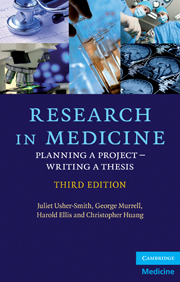Book contents
- Frontmatter
- Contents
- Preface
- 1 Introduction
- 2 Deciding whether to do research
- 3 Deciding when to do research
- 4 Selecting a research degree
- 5 Choosing a department, research supervisor and project
- 6 Applying for research positions and funding
- 7 Getting started
- 8 Overcoming frustration
- 9 Writing scientifically
- 10 Publishing a paper
- 11 Attending scientific meetings
- 12 Writing a thesis
- 13 Submitting a thesis and preparing for the viva voce examination
- Further reading
- Appendix: Information for research students wishing to study overseas
- Index
Preface
Published online by Cambridge University Press: 05 May 2010
- Frontmatter
- Contents
- Preface
- 1 Introduction
- 2 Deciding whether to do research
- 3 Deciding when to do research
- 4 Selecting a research degree
- 5 Choosing a department, research supervisor and project
- 6 Applying for research positions and funding
- 7 Getting started
- 8 Overcoming frustration
- 9 Writing scientifically
- 10 Publishing a paper
- 11 Attending scientific meetings
- 12 Writing a thesis
- 13 Submitting a thesis and preparing for the viva voce examination
- Further reading
- Appendix: Information for research students wishing to study overseas
- Index
Summary
Looking back on my own scientific work I should say that it shows no great originality but a certain amount of business instinct which leads to the selection of a profitable line. (E. D. Adrian, autobiographical notes [A. L. Hodgkin (1979): Biographical Memoirs of Fellows of the Royal Society 25, 1–73.])
Doctors and medical students experience a training directed primarily towards clinical practice. Yet, increasing numbers of the more successful additionally devote time to advancing knowledge, often while working for a research or intercalated Honours degree. Similarly, science students are selected for postgraduate work mainly through university degree results. However, little is said about the qualities one requires for successfully completing a research programme, and the extent to which these differ from what makes a successful doctor or undergraduate student. No doubt one requires originality, creativity or flair, but to attempt to define or expand upon these would be beyond the direct scope of this short book. Additionally, modern medicine encompasses an enormous breadth of subjects, and research is among the most individual of endeavours.
Nevertheless, one can discuss some of the more practical problems associated with pursuing research and working for a thesis and a capacity to tackle these fulfils a necessary, even if not a sufficient, condition for a successful research programme. We hope we have commented helpfully upon at least some of these hurdles, even if only briefly in a general way. If we thereby provoke constructive thought, even if not agreement, we shall feel we have achieved our object and have offered assistance to those seeking masterships, doctorates and honours degrees.
- Type
- Chapter
- Information
- Research in MedicinePlanning a Project – Writing a Thesis, pp. vii - xPublisher: Cambridge University PressPrint publication year: 2010



